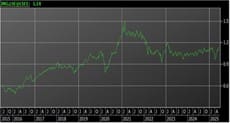

JPMorgan Emerging Markets (JMG) is co-managed by Austin Forey and John Citron, two seasoned investors with decades of combined experience navigating developing markets. They take a high- conviction, bottom-up approach to investing in emerging markets, seeking high-quality companies capable of compounding earnings sustainably over the long term and aiming to cut through short-term market noise. Their process is supported by JPMorgan’s global research platform and underpinned by a proprietary framework focussed on three key pillars: company economics, earnings duration, and governance quality. Stock selection is entirely fundamental, rooted in proprietary analyst research rather than top- down macro calls. From a broader coverage universe, the managers focus on a shortlist of around 200 names, ultimately distilled into a concentrated portfolio of around 55 stocks, classified into one of four tiers, Premium, Quality, Standard, or Challenged, depending on their long-term return potential and business quality.
Over the past year, the managers took advantage of market volatility by selectively adding to high-quality holdings at compelling discounts, whilst trimming areas where valuations had run ahead—particularly parts of the Indian market. Whilst JMG maintains a structural underweight to mainland China, reflecting ongoing political and economic risks, the managers do see some value, and over the past 12 months added Trip. com, a domestic travel leader with strong fundamentals, to the Portfolio. JMG’s long-term record remains strong, with solid outperformance over five and ten years, underpinned by its consistent focus on quality and resilience through market cycles (see Performance). The past 12 months have been challenging with market volatility and strong performance from lower-quality stocks that JMG typically avoids, weighing on returns at times. However, several strongly performing core holdings like TSMC, Tencent, and Infosys helped JMG edge ahead of the benchmark over the period.
Short-term volatility remains a defining feature of emerging markets, particularly in light of recent tariff announcements and ongoing geopolitical flux. However, this could prove an opportune moment to add exposure as valuations remain historically low, both relative to their own history and to developed markets, whilst long-term structural growth drivers appear intact. This backdrop reinforces the appeal of a consistent, high- quality, long-term-focussed investment approach. JMG outperformed its benchmark over the past year, buoyed by strong stock selection that helped counterbalance periods when its growth and quality bias proved to be headwinds, particularly during rallies in lower-quality cyclicals and companies with governance concerns. Its long-term record also remains strong, and it is well-positioned to capture the dynamic growth potential of emerging markets moving forward. Despite recent volatility, the managers’ focus on resilient, well-managed businesses exposed to strong structural tailwinds has not wavered—resulting in a portfolio that trades at a valuation premium but offers higher returns on equity, stronger balance sheets, and lower debt than the index. Although JMG’s investment process is deliberately designed for the long term, the managers have acted decisively when opportunities arise. We see recent activity as a clear recognition of current market dislocations, adding value to high-quality names where fundamentals remain robust and valuations have become compelling, whilst scaling back positions where valuations appear stretched. JMG has a strong long-term track record, the lowest ongoing fees in its sector, and is currently trading at a wider-than-average discount. For investors able to look through near-term volatility, JMG is a compelling long-term option for exposure to quality growth names across the developing world.
